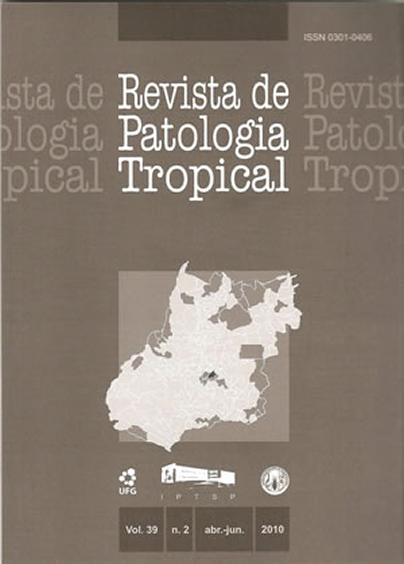ISOLADOS DE Cryptococcus neoformans, C. gattii e C. laurentii PRODUTORES DE PROTEASE E FOSFOLIPASE
DOI:
https://doi.org/10.5216/rpt.v39i2.10724Palavras-chave:
Fosfolipase, Protease, Cryptococcus neoformans, Cryptococcus gattii, Cryptococcus laurentii.Resumo
A criptococose é uma micose sistêmica com caráter oportunista, que pode acometer homens e diferentes espécies animais, principalmente em casos de imunodepressão. A levedura penetra pela via respiratória, pode disseminar-se por via hematógena e atingir o sistema nervoso central. Objetivando o isolamento da levedura
Cryptococcus neoformans a partir de sistema nervoso central de cães na cidade do Rio de Janeiro, procederam-se coletas de amostras de cérebro no Laboratório de Diagnóstico de Raiva do Instituto Municipal de Medicina Veterinária Jorge Vaitsman, no bairro da Mangueira, Rio de Janeiro. As etapas de isolamento, identificação e avaliação da produção de protease e fosfolipase ocorreram no Laboratório de Leveduras Patogênicas e Ambientais da Universidade Federal Rural do Rio de Janeiro (LLPA-UFRRJ). Para a avaliação de protease, utilizou-se meio de cultura contendo albumina bovina e para avaliação da produção de fosfolipase, o meio utilizado compunha-se de gema de ovo e CaCl2. Foram utilizadas 166 amostras de sistema nervoso central, com quatro isolamentos positivos para o gênero, sendo um de Cryptococcus laurentii, dois de Cryptococcus neoformans e um de Cryptococcus gattii, todos produtores de protease e fosfolipase.
Downloads
Downloads
Publicado
Como Citar
Edição
Seção
Licença
The manuscript submission must be accompanied by a letter signed by all authors stating their full name and email address, confirming that the manuscript or part of it has not been published or is under consideration for publication elsewhere, and agreeing to transfer copyright in all media and formats for Journal of Tropical Pathology.

